The Psychology of Power: Insights from Roman Emperors’ Rise and Fall explores the complex nature of power through the experiences of Roman emperors. It reveals the intricacies of human behavior and its impact on governance.
In this article, we will:
- Discuss why understanding the psychology of power is essential for comprehending leadership and authority.
- Analyze the lessons in power dynamics that can be learned from studying the rise and fall of Roman emperors.
- Explore how personal traits influence the acquisition and maintenance of power, providing valuable insights into effective leadership strategies.
Join us as we delve into history to uncover the fascinating connection between individual characteristics and the quest for power, revealing timeless truths that still hold relevance today.
Dynamics of Power in the Roman Empire
The Roman Empire lasted for nearly five centuries, during which about 60 emperors ruled. This period saw roughly 30 overthrows and numerous usurpations, highlighting the unstable nature of power acquisition and retention. Power was never simply taken by force; it required a careful balance of legitimacy and maintaining agreement among important groups.
The Three Main Factors Influencing an Emperor’s Power
There were three main factors that influenced an emperor’s ability to hold onto power:
- Military: The loyalty of the army was crucial. Emperors depended on military support not only to rise to power but also to survive threats.
- Senate: Although its authority diminished over time, the Senate’s approval provided symbolic legitimacy that could stabilize an emperor’s rule.
- People: Public support helped maintain order and prevent rebellions. Popularity could legitimize power beyond brute force.
An emperor who failed to secure this tripartite agreement often faced challenges labeled through terms like “tyrant” or “usurper.” These labels reflected the level of acceptance or rejection by these groups rather than just the actions of the ruler. For example:
- A ruler strongly supported by the military but rejected by the Senate might be called a usurper.
- One who alienated both military and people could quickly become a tyrant in historical accounts.
The Importance of Legitimacy
Legitimacy depended on more than just military power; it required navigating complex social and political relationships to build and maintain agreement. Emperors who understood this triad often had longer, more stable reigns, while those who ignored any factor faced quick downfall.
Understanding these dynamics shows how psychology influenced not only personal qualities but also strategic choices in gaining power within the Roman Empire.
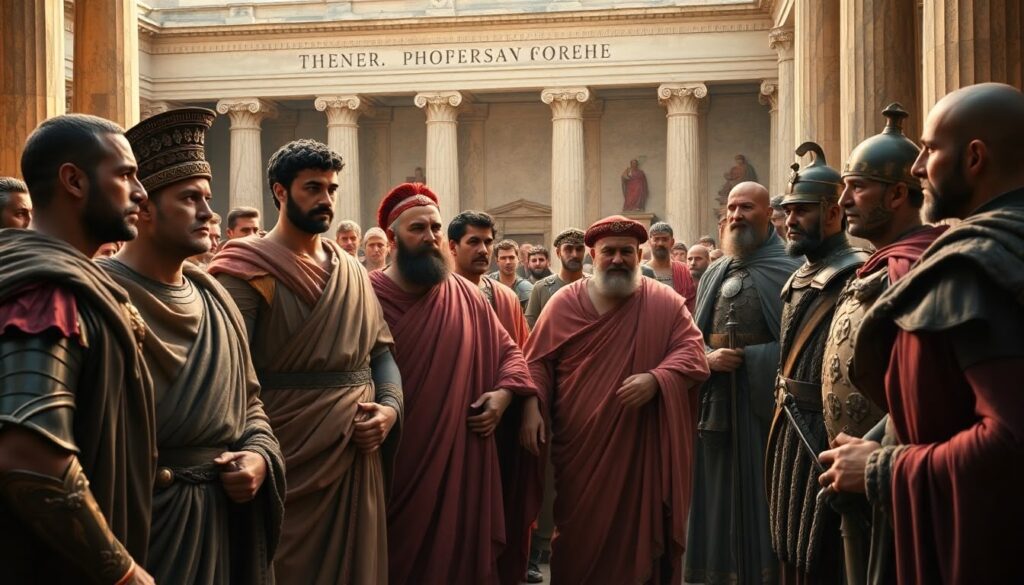
Strategies for Maintaining Power
The strategies used by Roman emperors to maintain power were crucial in navigating the complex dynamics of the Empire. Two key tactics that played a significant role in their reigns were matrimonial alliances and the elimination of rivals.
Matrimonial Alliances
Emperors often solidified their power through strategic marriages, forming alliances with influential families or other ruling dynasties. By marrying into prominent households, they could secure political support, forge new connections, and strengthen their legitimacy. These unions not only helped in expanding their network of allies but also provided a sense of stability and continuity to their rule.
Elimination of Rivals
In the ruthless world of Roman politics, eliminating potential threats was a common strategy for maintaining power. Emperors would often resort to removing rival claimants to the throne through exile, imprisonment, or even assassination. By getting rid of competitors, they could consolidate their authority and reduce the chances of internal conflicts or uprisings.
Balancing Innovation with Tradition
Another crucial aspect of maintaining power was the delicate balance between innovation and tradition. Emperors had to navigate between introducing new policies or reforms to adapt to changing circumstances while respecting established norms and customs to maintain their legitimacy in the eyes of the Senate and the people. Straying too far from tradition could risk alienating key supporters, while being too conservative might lead to stagnation and loss of relevance.
Matrimonial alliances and the elimination of rivals were essential tools used by Roman emperors to secure their positions of power. By carefully managing these relationships and balancing innovation with tradition, they could navigate the treacherous waters of imperial politics and ensure the longevity of their reigns. However, it’s important to note that these strategies were not without risks. For instance, while matrimonial alliances could strengthen ties, they also had the potential to backfire if the alliance turned sour or if the spouse became a rival instead.
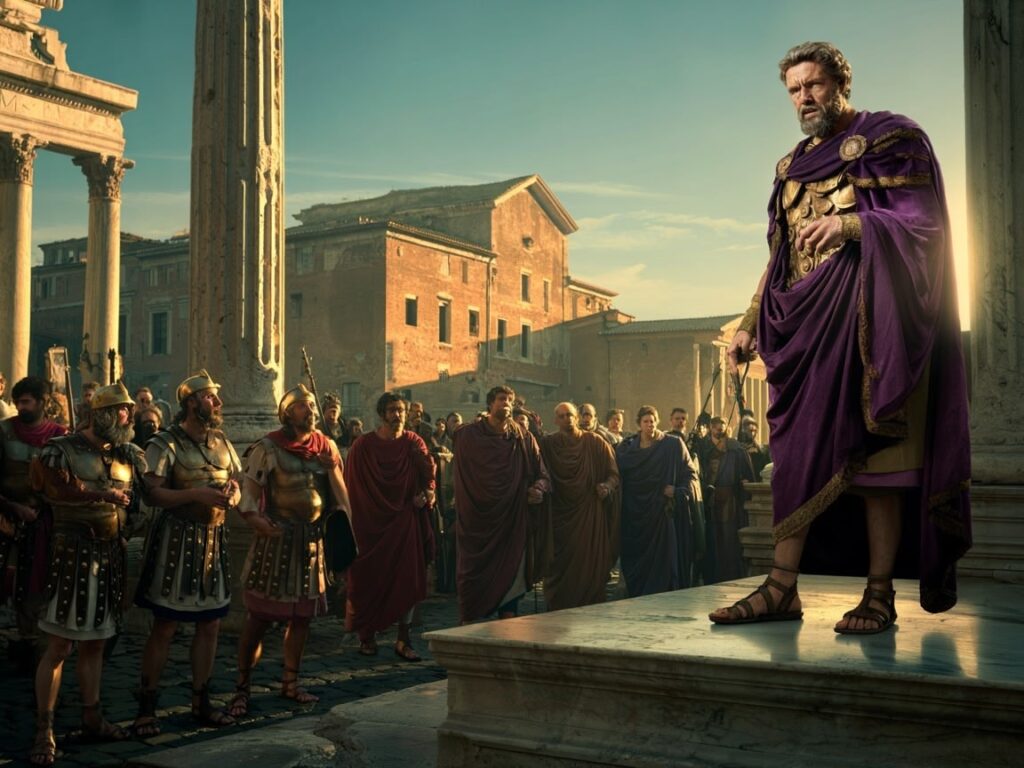
Senate Hostility and Political Rivalries
Senate hostility often served as a clear indicator of the intense political rivalries that shaped the Roman Empire’s leadership. Emperors faced opposition not only from external enemies but also from within the Senate, where factions competed for influence. This internal conflict reflected deeper struggles over legitimacy and control, as senators could make or break an emperor’s hold on power.
Historical records demonstrate how Senate hostility was more than mere dissent; it was a strategic tool used by political rivals. Labels such as “tyrant” or “usurper” were frequently employed in senatorial discourse to delegitimize rulers lacking broad consensus. For example:
- Nero experienced growing Senate resistance tied to his erratic behavior and controversial policies.
- Domitian faced hostility partly because of his autocratic rule and efforts to bypass traditional senatorial privileges.
These conflicts were not static but dynamic, with alliances shifting according to changing political landscapes. Ancient historians like Tacitus, Suetonius, and Cassius Dio provide valuable insights into these evolving power dynamics. Their accounts reveal moments when Senate consensus fractured and reconciled, highlighting the fragile nature of imperial authority.
The Psychology of Power: Insights from Roman Emperors’ Rise and Fall benefits greatly from examining these historical sources. They expose how personal ambitions, ideological clashes, and institutional tensions intertwined to influence governance. Senate hostility thus encapsulates the broader theme of contested power—a struggle between individual emperors’ will and collective elite interests that continually shaped Rome’s political arena.
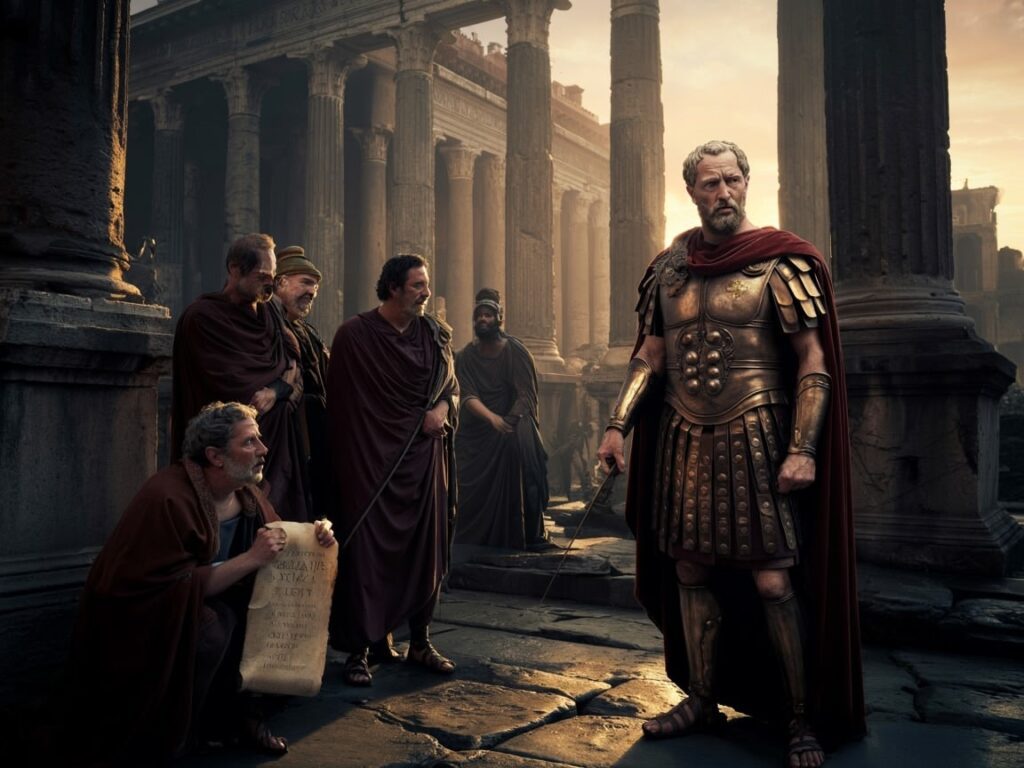
Psychological Challenges Faced by Emperors
The psychology of power placed significant burdens on Roman emperors, manifesting in various psychological challenges throughout their reigns. Two key aspects stand out:
1. Managing Expectations from Elites and the Public
Emperors were often caught between the expectations of the elite class and the general public. Balancing the demands of these different groups was a delicate tightrope walk that required astute political maneuvering and strategic decision-making. Failure to meet these divergent expectations could lead to unrest, conspiracies, or even rebellions, jeopardizing their power and stability.
2. Marcus Aurelius’s Stoic Philosophy
Marcus Aurelius, known for his philosophical wisdom, particularly embraced Stoicism to navigate the psychological challenges of ruling an empire. Stoicism emphasized acceptance of reality, control over emotions, and resilience in the face of adversity. By following Stoic principles, Marcus Aurelius aimed to prevent feelings of frustration and anger that could cloud his judgment and lead to impulsive actions. This philosophical approach not only helped him cope with the pressures of governance but also influenced his decision-making process, promoting a more measured and rational leadership style.
Understanding how Roman emperors grappled with managing expectations and employed philosophical frameworks like Stoicism sheds light on the intricate interplay between personal psychology and wielding power effectively in a complex political landscape.
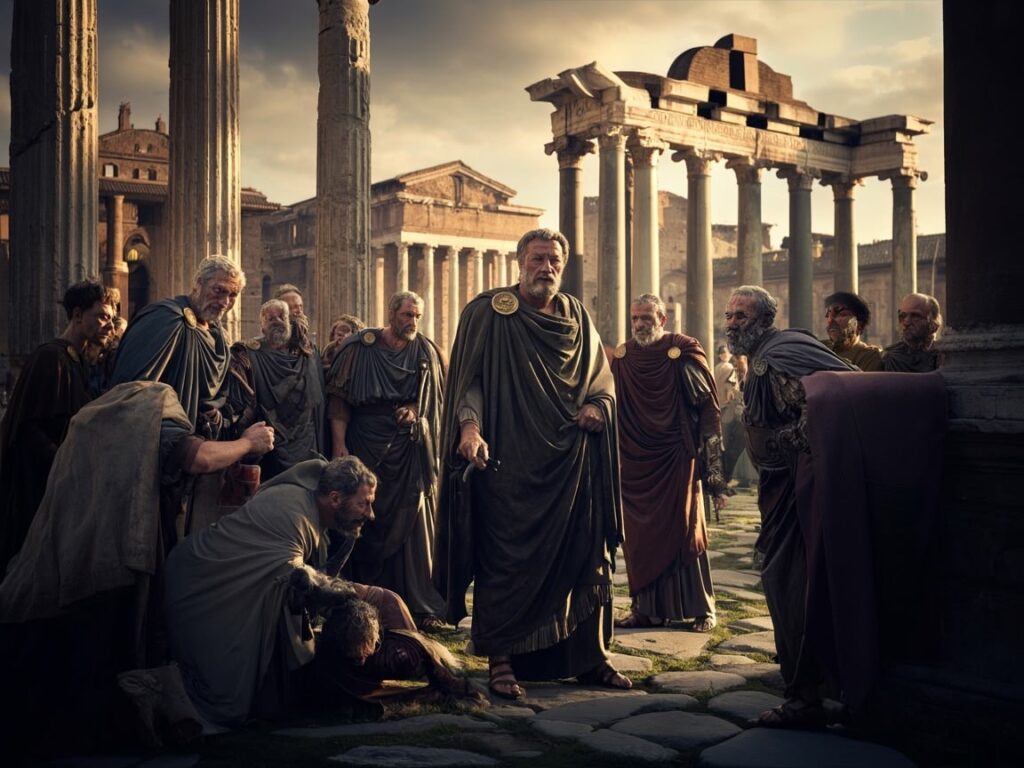
Succession Planning and External Threats
Succession planning in the Roman Empire was a complex challenge for emperors, both psychologically and politically. A prime example of this difficulty is Marcus Aurelius’s decision to choose his son Commodus as his successor. Unlike many rulers who opted for capable generals or experienced statesmen, Marcus faced ethical constraints and personal loyalties that influenced his choice.
Challenges in Succession Planning
- Balancing family loyalty with the welfare of the state.
- The risk of empowering an incompetent or unpopular successor.
- Avoiding assassination or forced removal due to moral or political reasons.
Marcus Aurelius’s Stoic mindset accepted the uncertainty but could not fully resolve the dilemma posed by Commodus’s temperament and abilities. The emperor knew that Commodus lacked the virtues necessary for effective rule, yet withdrawing his succession would have led to instability or violence.
External Threats Intensifying Internal Problems
The challenges within the empire were further exacerbated by external threats:
- Plague: A devastating epidemic weakened Rome’s population and military strength, increasing pressure on leadership continuity.
- Invasion: Borders faced constant threats from Germanic tribes and other enemies, demanding a strong and decisive ruler.
The combination of these external pressures and imperfect succession planning created a fragile environment. During Commodus’s reign, instability grew, highlighting how crucial succession decisions were to the survival of the empire.
Personal Character and Political Influence
The psychology of power among Roman emperors shows how personal character significantly influenced their ability to gain and maintain authority. Traits like decisiveness, charisma, and resilience often determined how emperors dealt with the complicated political situation. Emperors such as Augustus showed a mix of careful restraint and ambition, earning him lasting respect. On the other hand, emperors seen as unpredictable or cruel quickly lost support.
Public perception was crucial in legitimizing rule. The emperor’s image was carefully crafted through public ceremonies, coinage, and propaganda to evoke stability and divine favor. Failure to maintain a positive public image could lead to unrest or rebellion. For example, Nero’s erratic behavior and extravagant spending alienated both elites and common citizens, contributing to his downfall.
Military support was the foundation of imperial power. Commanders who secured loyalty from legions could effectively challenge or defend the throne. The army’s allegiance was often swayed by pay, promises of land, or personal loyalty to the emperor. This reliance on military backing made emperors vulnerable to coups but also allowed skilled generals like Septimius Severus to rise from obscurity.
Political maneuvering involved forming alliances, exploiting rivalries, and manipulating Senate factions. Emperors skilled in diplomacy balanced competing interests within Rome’s elite while ensuring their dominance over state affairs. The intricate web of relationships meant that personal character influenced not only direct interactions but also broader power structures.
Key elements influencing rise and fall:
- Personal traits shaping leadership style
- Public image as a tool for legitimacy
- Military loyalty securing practical control
- Political strategy managing elite consensus
These factors constantly interacted in The Psychology of Power: Insights from Roman Emperors’ Rise and Fall, showing that imperial success was never guaranteed by force alone but required skillful navigation of human nature and institutional dynamics. Additionally, it is crucial to note that ethical considerations also played a role in governance, influencing public perception and trust in leadership. Furthermore, understanding the psychological aspects that drive political behavior can provide deeper insights into the dynamics of power among these historical figures.
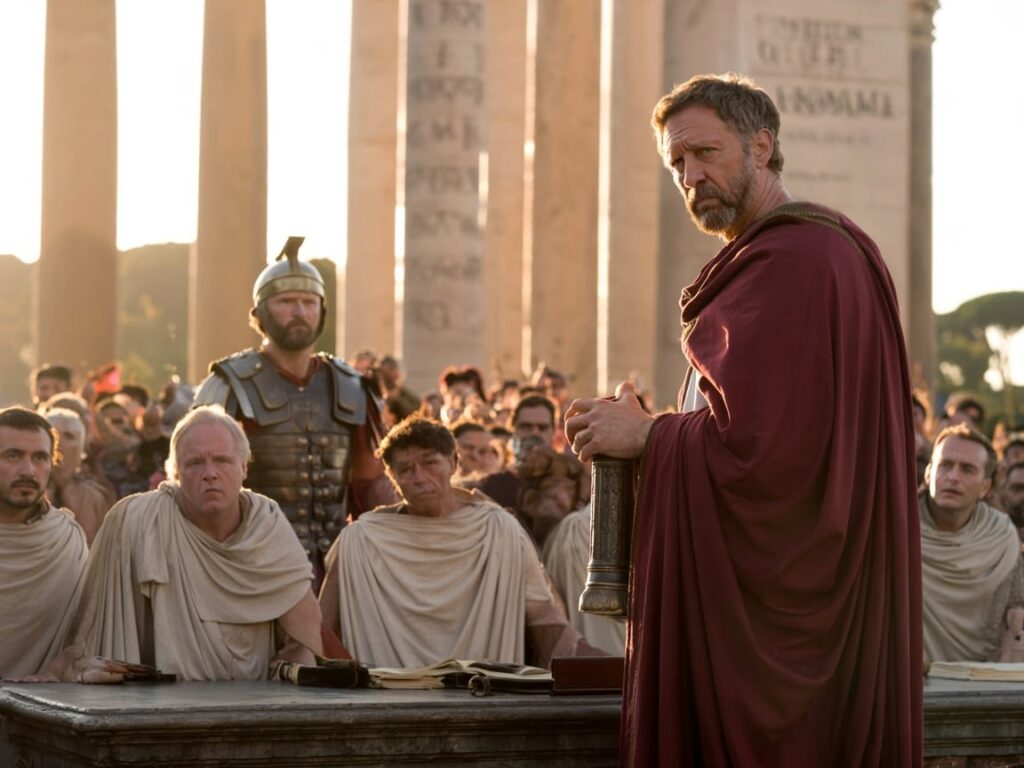
Reflection on Human Nature
The Psychology of Power: Insights from Roman Emperors’ Rise and Fall reveals enduring human nature themes that transcend time and culture. Studying these rulers shows how acceptance plays a crucial role in leadership — embracing reality without denial helps prevent destructive emotions. Marcus Aurelius exemplified this by practicing Stoicism to maintain calm amid chaos.
Control over emotions emerges as another vital lesson. Power often magnifies feelings like anger, fear, and pride, which can cloud judgment and provoke downfall. Successful emperors managed these internal struggles effectively, while those who failed frequently faced ruin.
The impact of power on behavior highlights an intrinsic human vulnerability: absolute power challenges personal integrity and self-awareness. These ancient stories emphasize the delicate balance between authority and humility, reminding you that power’s psychological effects are complex yet universally relevant. Recognizing these patterns enhances understanding of leadership dynamics both in history and in your own experience.

